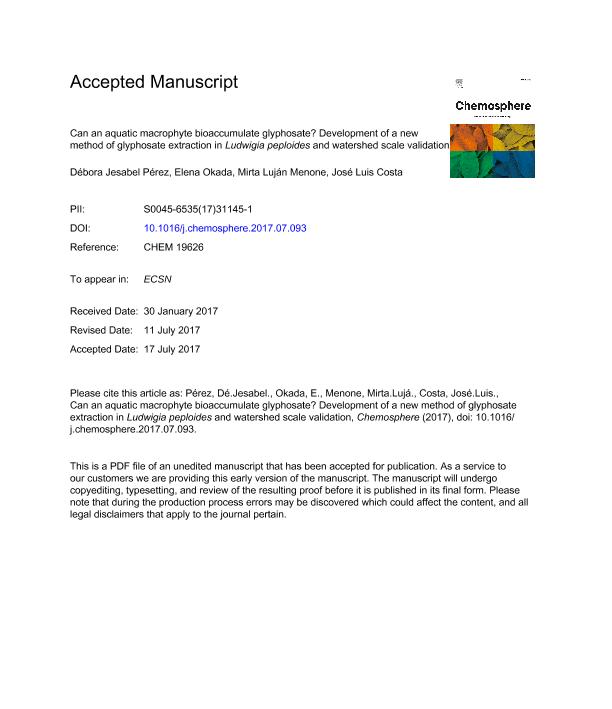Mostrar el registro sencillo del ítem
dc.contributor.author
Pérez, Débora Jesabel

dc.contributor.author
Okada, Elena

dc.contributor.author
Menone, Mirta Lujan

dc.contributor.author
Costa, Jose Luis

dc.date.available
2018-12-04T17:37:07Z
dc.date.issued
2017-07
dc.identifier.citation
Pérez, Débora Jesabel; Okada, Elena; Menone, Mirta Lujan; Costa, Jose Luis; Can an aquatic macrophyte bioaccumulate glyphosate? Development of a new method of glyphosate extraction in Ludwigia peploides and watershed scale validation; Pergamon-Elsevier Science Ltd; Chemosphere; 185; 7-2017; 975-982
dc.identifier.issn
0045-6535
dc.identifier.uri
http://hdl.handle.net/11336/65730
dc.description.abstract
Glyphosate is intensively used in agricultural fields and it is frequently detected in non-target wetland ecosystems. The floating hydrophyte Ludwigia peploides is widely distributed in American streams and it is an abundant species. Therefore, our objectives were (1) to establish and validate an extraction and quantification methodology for glyphosate in L. peploides and (2) to evaluate the role of this species as a potential glyphosate biomonitor in an agricultural watershed. We developed a new method of glyphosate extraction from leaves of L. peploides. The method recovery was 117± 20% and the matrix effect 20%. To validate the method using environmental samples, plants of L. peploides were collected in March 2016 from eight monitoring sites of El Crespo stream. Surface water and sediment samples were collected at the same time to measure glyphosate and to calculate bioconcentration factors (BCFs) and biota-sediment accumulation factors (BSAFs). Glyphosate was detected in 94.11% in leaves, the concentrations ranging between 4 and 108 μg/kg. Glyphosate was detected in surface water and sediments at 75% and 100% of the samples, at concentrations that varied between 0 and 1.7 μg/L and 5–10.50 μg/kg dry weight, respectively. The mean BCFs and BSAFs were 88.10 L/Kg and 7.61, respectively. These results indicate that L. peploides bioaccumulates glyphosate mainly bioavailable in the surface water. In this sense, L. peploides could be used as a biomonitor organism to evaluate glyphosate levels in freshwater aquatic ecosystems because, in addition to its capacity to bioconcentrate glyphosate, it is easy to sample and it has a restricted mobility.
dc.format
application/pdf
dc.language.iso
eng
dc.publisher
Pergamon-Elsevier Science Ltd

dc.rights
info:eu-repo/semantics/openAccess
dc.rights.uri
https://creativecommons.org/licenses/by-nc-sa/2.5/ar/
dc.subject
Agricultural Watershed
dc.subject
Bioconcentration Factor
dc.subject
Biota-Sediment Accumulation Factor
dc.subject
Glyphosate Extraction
dc.subject
Hydrophyte
dc.subject
Ludwigia Peploides
dc.subject.classification
Meteorología y Ciencias Atmosféricas

dc.subject.classification
Ciencias de la Tierra y relacionadas con el Medio Ambiente

dc.subject.classification
CIENCIAS NATURALES Y EXACTAS

dc.title
Can an aquatic macrophyte bioaccumulate glyphosate? Development of a new method of glyphosate extraction in Ludwigia peploides and watershed scale validation
dc.type
info:eu-repo/semantics/article
dc.type
info:ar-repo/semantics/artículo
dc.type
info:eu-repo/semantics/publishedVersion
dc.date.updated
2018-10-23T14:48:09Z
dc.journal.volume
185
dc.journal.pagination
975-982
dc.journal.pais
Estados Unidos

dc.journal.ciudad
Nueva York
dc.description.fil
Fil: Pérez, Débora Jesabel. Consejo Nacional de Investigaciones Científicas y Técnicas; Argentina. Instituto Nacional de Tecnología Agropecuaria; Argentina
dc.description.fil
Fil: Okada, Elena. Consejo Nacional de Investigaciones Científicas y Técnicas; Argentina. Instituto Nacional de Tecnología Agropecuaria; Argentina
dc.description.fil
Fil: Menone, Mirta Lujan. Consejo Nacional de Investigaciones Científicas y Técnicas. Centro Científico Tecnológico Conicet - Mar del Plata. Instituto de Investigaciones Marinas y Costeras. Universidad Nacional de Mar del Plata. Facultad de Ciencias Exactas y Naturales. Instituto de Investigaciones Marinas y Costeras; Argentina
dc.description.fil
Fil: Costa, Jose Luis. Instituto Nacional de Tecnología Agropecuaria; Argentina
dc.journal.title
Chemosphere

dc.relation.alternativeid
info:eu-repo/semantics/altIdentifier/doi/https://dx.doi.org/10.1016/j.chemosphere.2017.07.093
dc.relation.alternativeid
info:eu-repo/semantics/altIdentifier/url/https://www.sciencedirect.com/science/article/pii/S0045653517311451
Archivos asociados
